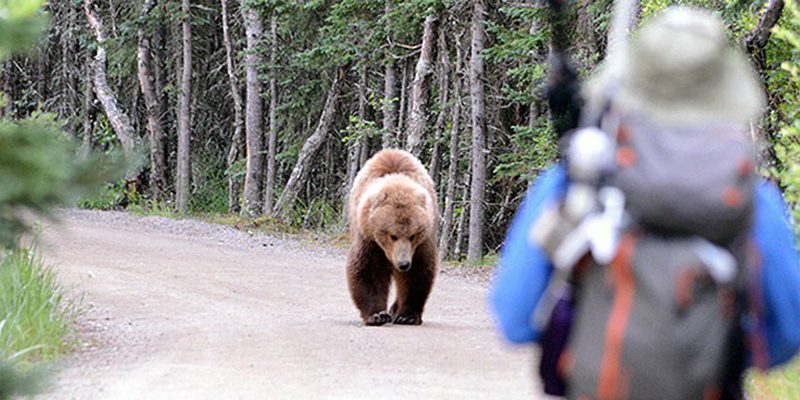Generally speaking, the grizzly bear is a shy animal that avoids human encounters, but there are certain situations in which they may become aggressive or attack.
Bear behavior can be unpredictable, however, understanding what conditions can lead to bear attacks is the key to avoiding bear attacks. Here are some points you need to know why a grizzly bear attack human.
Surprise or feeling threatened
If a grizzly bear is surprised or feels threatened, it may respond defensively. Approaching a bear too closely, especially if it has cubs or a food source nearby, can trigger an aggressive response.
Defensive protection of Cubs
Female grizzly bears are very protective of their cubs, and if they perceive a threat to their offspring, they may exhibit aggressive behavior. It’s important to give mother bears and their cubs a wide berth and avoid getting between them.
Food competition
Bears have a strong sense of smell and are attracted to food sources. If a grizzly bear perceives humans as a threat or competition for its food, it may display aggressive behavior to protect its resources.
Surprising a bear at close range
Bears have a natural instinct to defend themselves, and if you suddenly encounter a grizzly bear at a close distance, it may react defensively and attack.
Provoking or harassing a bear
Intentionally provoking, harassing, or getting too close to a grizzly bear can lead to an aggressive response. It’s crucial to give bears their space and observe them from a safe distance.
How to keep safe from grizzly bear attacks?
Encountering a grizzly bear can be a potentially dangerous situation. If that happens, stay calm and don’t panic. Following the guidelines can keep you safe from grizzly bear attacks.
Stay alert and make noise
Bears are less likely to approach if they are aware of your presence. Make noise while hiking or traveling in areas where bears are known to be present. Clap your hands, talk loudly, or use bear bells to alert them of your presence.
Carry bear spray
Bear spray is a highly effective deterrent that can be used to deter bears from approaching. Carry bear spray in a holster on your belt or in an easily accessible location, and know how to use it properly. It should be sprayed when the bear is within 30 to 60 feet (9 to 18 meters) of you.
Avoid surprising bears
If you come across a bear, try to give it as much space as possible. If you’re hiking in dense vegetation or areas with poor visibility, make noise to alert any nearby bears of your presence.
Do not run
Running may trigger a bear’s predatory instinct, and they can outrun humans easily. Instead, stay calm and slowly back away while keeping an eye on the bear.
Stand your ground
If a grizzly bear charges you, it may be a bluff charge. Stand your ground, raise your arms to make yourself appear larger, and speak calmly. Do not scream or make sudden movements. Once the bear realizes you are not a threat, it may stop the charge or veer off.
Play dead if attacked
In the rare event that a grizzly bear makes contact with you, curl up in a fetal position with your hands clasped behind your neck and your legs protecting your vital organs. Try to remain as still as possible until the bear leaves the area. Playing dead is generally recommended for grizzly bears but not for black bears.
Travel in groups
Bears are less likely to approach groups of people. When hiking or camping in bear country, try to travel with others rather than going alone.
Be cautious around food and garbage
Store food, trash, and scented items in bear-resistant containers or hang them from a tree at least 10 feet (3 meters) off the ground and 4 feet (1.2 meters) from the trunk. Proper food storage helps avoid attracting bears to your campsite.



